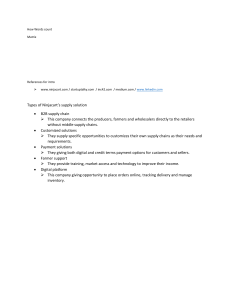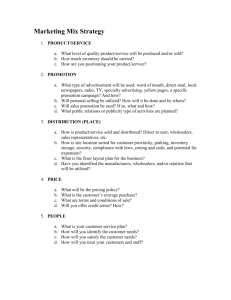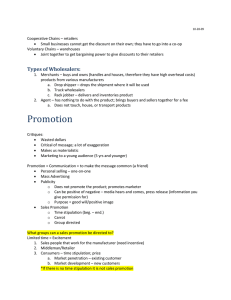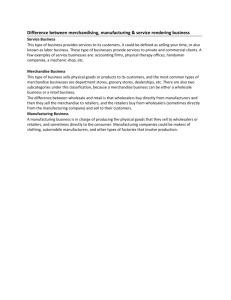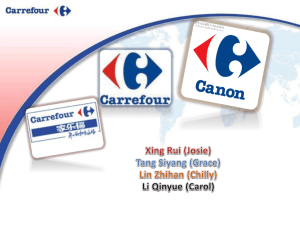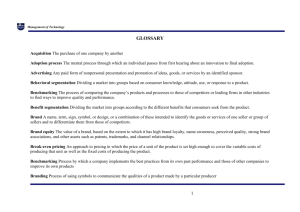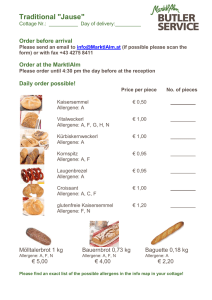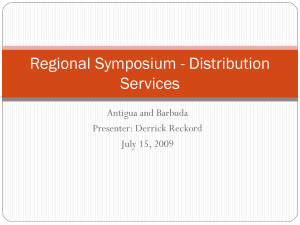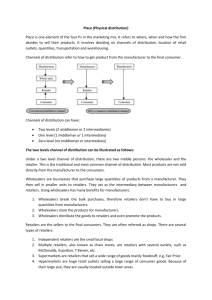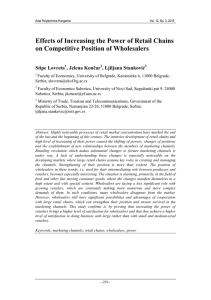Linking Producers to Modern Food Retailers
advertisement
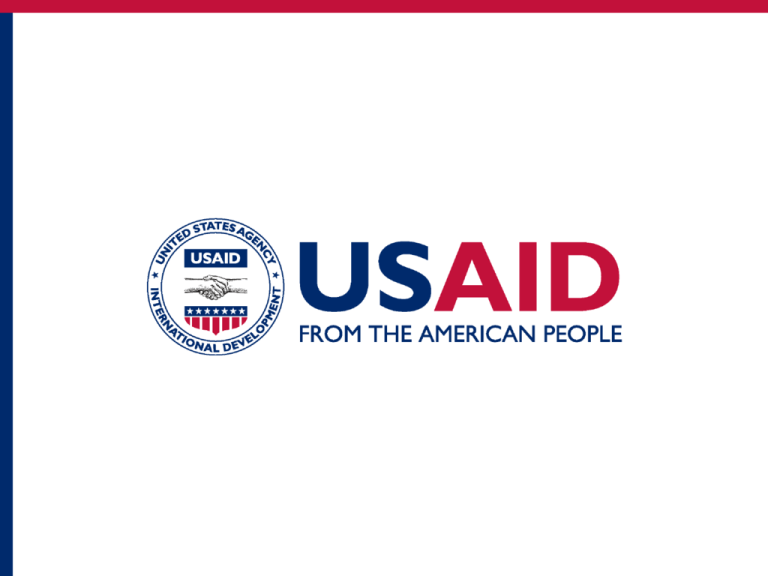
LINKING PRODUCERS TO MODERN FOOD RETAILERS: A Survey of Buyer Interest in the Balkans Prepared for the U.S. Agency for International Development By Chemonics International and J.E. Austin Associates MAY 2005 CONTENT OF THE PRESENTATION • • • • • • • Introduction Demand in the Region Positive Elements Obstacles Comments by Country Recommendations Conclusions INTRODUCTION – STUDY OBJECTIVES 1. Determine potential for farmers to sell to large-scale buyers 2. Suggest regional interventions by USAID INTRODUCTION – STUDY DESIGN • • • • Limited Internet research Interviews in six countries Analysis and conclusions Written report INTRODUCTION – DATES, CONSULTANTS, COUNTRIES Research done in April and May 2005 Douglas Griffith and Jeff MacKenzie Chemonics International, Inc. Romania and Serbia Marcos Arocha and Kenneth Weiss J.E. Austin Associates, Inc. Albania, Bosnia-Herzegovina, Bulgaria and Montenegro INTRODUCTION – PEOPLE INTERVIEWED Roughly 70 interviews in 6 countries Managers of hypermarket and supermarket chains, processing companies, hotel chains, wholesale companies INTRODUCTION - MAP OF REGION DEMAND – INFLUX OF BIG RETAILERS • Metro, Carrefour, Billa, Mercator, etc. • A worldwide phenomenon • Growth in every country visited • Dramatic expansion plans DEMAND – PRODUCTS OF INTEREST • Vegetables – salad and other • Fruits – melons, apples, etc. • Meat (packaged cuts) - beef, turkey, etc. • Dairy – fresh milk, white cheese, etc. DEMAND – PROCUREMENT METHODS • Interest in local products (esp. fresh) • Local decision-making / buying • Emphasis on quality and quantity • Preference for longterm relationships • Discounts and slotting fees • Private labeling, electronic systems • Increasing use of central warehousing • Long payment terms ON THE POSITIVE SIDE • • • • Big stores becoming more important Open to potential new suppliers Superb preparation for exporting Several success stores CONSTRAINTS I • • • • • • Critical mass and continuity Quality and condition Packaging Cold storage Business informality Supplier agreements unreliable CONSTRAINTS II • • • • • • Definition of quality Difficulty finding investors Difficulty obtaining loans Competition from imports Strict buyer conditions Inadequate extension services RECOMMENDATIONS – QUALITY • • • • Definitions of quality Health and safety standards Post-harvest handling Packaging information and materials RECOMMENDATIONS – RELIABILITY • • • • Sustainable business models Extended growing seasons Producer cooperation Long-term relationships RECOMMENDATIONS – ACCESS TO CREDIT • • • • New financial mechanisms Electronic information systems “Bankable” supply relationships International partnerships RECOMMENDATIONS – OTHER • Agricultural extension • Turn farms into businesses • Conferences, exhibits, etc. COUNTRY SUMMARIES I BULGARIA • Metro, Billa, ENA, Ramstore, HITT • Kaufland and others • Produce from local sources • Government regulations • Protection of “infant industries” ROMANIA • Ten years with big stores; trend continues • Metro, Carrefour, Mega Image, Billa, etc. • Most produce imported • Role of wholesalers • Consumer behavior changing COUNTRY SUMMARIES II BOSNIAHERZEGOVNIA • Small market • Mercator, Velpro, Interex, VF Commerce • The role of wholesalers • The baking industry SERBIA • Mercator, C-Market, Super Vero, Metro, and others • Growing numbers of food retailers COUNTRY SUMMARIES III ALBANIA • First Hypermarket to open in Sept. • Small supermarket chains • Hotels on the coast • Greenhouse industry MONTENEGRO • Confusion from political situation • Surprising number of stores • ERA, Voli Trade, and Mex Centar • The Grey Market POSSIBLE REGIONAL ACTIVITIES I • • • • • Cooperation by producers Cooperation by wholesalers Private brands and co-branding Supplying food chains for export Buyer-seller events POSSIBLE REGIONAL ACTIVITIES II • • • • • Training on grades and standards Guide to selling to supermarkets Guidelines on packaging Business plan for cold storage IT solutions for tracing products CONCLUSIONS 1. Market changes are working against small farmers, processors, wholesalers and retailers. 2. Selected interventions will help small business to cope and survive. 3. Some interventions may be appropriate for USAID at the regional level. — END — THANK YOU
